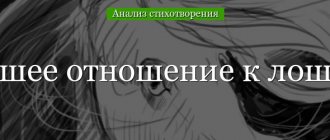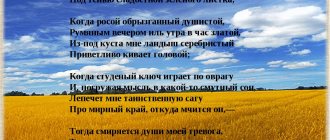Futurist poets of the early 20th century set as their goal the creation of completely new poetry. To do this, they experimented with form, called for word creativity and boldly expressed in their texts the denial of generally accepted values. One of the brightest representatives of this trend was V. Mayakovsky, whose early poems clearly demonstrate the rebellious spirit of futurism. The many-wise Litrekon brings to your attention an analysis of the poem “Here!” according to a plan that will demonstrate all the structural and semantic originality of this vibrant text.
History of creation
V. Mayakovsky created the poem “Here!” in 1913. The poet managed to read his accusatory text for the first time at the opening of the Moscow literary cabaret “Pink Lantern”, where he was invited. The poem aroused the ire of the public, which even required police intervention.
An interesting fact is that the reading took place on October 19 - the anniversary of the Pushkin Lyceum, because Mayakovsky in his poem develops the theme of the poet and poetry, traditional for Russian literature and repeatedly raised by A. S. Pushkin.
History of writing
Vladimir Mayakovsky was a stranger in his circle. In 1930, the man became a member of the Association of Proletarian Writers, and then opened an exhibition, which he dedicated to the twentieth anniversary of his creative activity. However, none of his friends attended the event due to the author’s membership in RAPP.
Soon, the leader of the association, Ermilov, wrote an article on Mayakovsky’s creative activity, in which he expressed sharp criticism. For the writer this was a real blow. A month and a half later, Vladimir committed suicide. The eternal social struggle is reflected in the author's poetry.
All of the poet’s work is permeated with outrageousness and protests. The work “Nate” is the clearest example of confirmation of the veracity of this idea. It is noteworthy that the verse was written 17 years before the famous events . The author's genius helped him see more than ordinary people. Mayakovsky created this work in 1913. This literary masterpiece dates back to the heyday of the author’s creative activity.
The writer's worldview was greatly influenced by the 1907 revolution. During this period, Mayakovsky was in adolescence. It's no secret that teenagers have a more impressionable psyche, so it's easier to fall under someone's influence. Consequently, the work “Nate” is a challenge to the bourgeoisie.
Genre, direction, size
According to the genre of “Nate!” can be classified as satirical poems. The poet directs his accusatory pathos at a complacent public, for whom only the world of material things is accessible and important, ridicules and insults it.
The text clearly shows the basic principles proclaimed by the Russian futurists. The lyrical hero opposes himself to the crowd, bringing down on it a whole barrage of ridicule and derogatory descriptions.
The poet also experiments with the form of his work, which he creates using accented verse, that is, he simply uses approximately the same number of stressed syllables in each stanza. In the poem “Here!” Accurate and inaccurate, male and female rhymes alternate, cross rhymes are chosen.
Composition
The poem "Here!" consists of three quatrains and one quintuple.
- The first stanza is an exposition, outlining the scenery of the action. The reader is presented, on the one hand, with a well-fed and indifferent audience, represented by the general mass of “flabby fat,” and on the other, with a poet opening “boxes of poetry” to them.
- Next, Mayakovsky tries to take a closer look at these people and describes repulsive material details of their appearance, such as cabbage stuck in their mustaches or excessive whitewash applied to their faces.
- The public is focused on things and pleasures, it turns out to be unable to consider and appreciate the “butterfly of the poet’s heart.” Uniting again into a crowd, these people become for the poet a terrible “hundred-headed louse”, which, in a fit of rage, is capable of not only staining in the mud, but also trampling a person it dislikes.
- In the last stanza, the poet again calls himself “the priceless words spendthrift and spender,” thus creating a ring composition and returning the image of the lyrical hero to the fore. He boldly opposes the crowd that he hates; it costs him nothing, if he wants, to laugh and spit in her face.
Images and symbols
The lyrical hero of the poem “Here!” close to V. Mayakovsky himself. This is, first of all, a rebel, brave and independent, obeying only his mood. He can make faces in front of the crowd, or he can simply spit in their face. At the same time, this hero is a poet, which means he is endowed with a sensitive and vulnerable heart, which he himself compares to a butterfly.
“Butterfly of the poet’s heart” is one of the central images of the text. A butterfly is a fragile and beautiful insect that can die from a careless touch. In the same way, “dirty galoshes” in which the crowd tramples on his sincere feelings and impulses are destructive for the poet, since they are unable and do not want to understand them.
Mayakovsky twice calls himself “the priceless words of a spendthrift and a spendthrift.” Despite everything, the poet emphasizes, he is ready to continue to reveal his soul to the crowd, juggling priceless words and bizarre images in an attempt to reach the public.
The crowd itself appears in the poem in the unaesthetic image of a “hundred-headed louse”, compared to an insect parasitizing on others, repulsive and unpleasant. This image is strengthened by the description of individual units of the public that appeared before the poet: a man with cabbage in his mustache or a woman “looking like an oyster from the shell of things.”
“Here!”, analysis of Mayakovsky’s poem
Poets are unusual people. Not like everyone else. They have a heightened perception of reality, a special, metaphorical language. Poetry is alien to the common man. Obviously, this is why the confrontation between the poet and the crowd in Russian literature has been known since the time of Alexander Sergeevich Pushkin. and in the world - since ancient Greek times. In 1828, in a difficult time of uncertainty and loneliness, Pushkin wrote the poem “The Poet and the Crowd.” His hero, who has no mutual understanding with the “stupid rabble,” prefers creative solitude.
This is not the hero of the 20th century poet Vladimir Mayakovsky. Like the futurists themselves, like Vladimir Mayakovsky himself, the hero of early lyrics challenges the crowd. Even the titles of these works contain a call akin to an order: “Listen!” “Here!”, “You!” .
In the poem “Here!” (1913) the poet is not “heaven’s chosen one,” but a “rude Hun.” And the collective image of the crowd is disgusting:
The crowd will go wild, the hundred-headed louse will rub against each other and bristle its legs.
Already from the first lines, when the hero is sure that in an hour “your flabby fat will flow out drop by drop.” the accusatory pathos of this poem becomes obvious. Moreover, the poet himself had the opportunity to throw this accusation in the face of the decent bourgeois public, who gathered for the opening of the Pink Lantern cabaret, and Mayakovsky was invited as a guest.
The poem "Here!" contrasts not just the poet and the crowd. At the beginning of the twentieth century, on the eve of the First World War, life in Russia was not of a high standard. Therefore, people who received large incomes came to cafes, restaurants, cabarets: speculators, traders, tradesmen. Such representatives of society sometimes profited from the misfortune of others, while becoming rich themselves, and spent it on food and entertainment.
For the hero, this material world is associated with satiety and, as a result, with complacency and stupidity. The hero’s world is represented by other values: his wealth is “so many boxes of poems.” and he himself is “a spendthrift and a spendthrift of priceless words.” Of course, he calls himself that because he is ready to open his soul to anyone, so that precious words reach everyone’s heart, but he just doesn’t see worthy listeners. This is either a man who “has cabbage somewhere in his mustache, half-eaten cabbage soup.” or a woman who was “thickly whitened.” and she “looks like an oyster from the shell of things.”
For now they are harmless: after all, the one who sits in his “shell of things.” can spend his whole life there without causing any harm to anyone. Whether such a person exists or not is not interesting. Even in the fairy tale “The Wise Minnow” by M.E. Saltykov-Shchedrin, this type of average person who “lived and trembled and died and trembled” was ridiculed.
But Mayakovsky understood that sooner or later there would be more such people, and they would turn into a threatening force - into a “hundred-headed louse.” which “bristles its legs” and “in galoshes and without galoshes” perches on the “butterfly of a poet’s heart.” Such a metaphor, at first glance, is not comparable in style to the vocabulary of the entire poem: these are not rude words, these are not shocking statements, and finally, this is not a challenge. On the contrary, a butterfly is a fragile and defenseless creature that cannot be touched, even just touched, otherwise the butterfly will die.
After reading these lines, for a moment one becomes sincerely sorry for the hero doomed to such “fame.” But already in the next quatrain the former hero appears - self-confident, loud-voiced, despising everyone who is not on a par with him. Human nature, as Mayakovsky believed, is the unity of two principles: biological and spiritual. In bourgeois society, these principles are separated, so the spiritual is not only separated from the material - there is simply no place for it. Therefore, the author depicts everything material in a deliberately repulsive way: “flabby fat.” "half-eaten cabbage soup." “cabbage in my mustache.”
In the last quatrain the “rude Hun” appears. who not only can afford not to grimace in front of the chewing crowd, but can even “laugh and joyfully spit in the face” of those for whom art is just a reason to have fun. The composition closes in a ring by repeating words from the beginning of the poem:
I am a spender and spendthrift of priceless words.
Thus, the last word remains with the hero. This is all Mayakovsky. In his early poetry, according to critics, one can hear an emotional range - from passionate intensity to shy timidity, from confidential confession to angry diatribe. The lyrical hero becomes a kind of center of harmony, and therefore finds himself alone. Perhaps the challenge sounded in the poem “Here!” - this is not so much a desire to expose as a desire to attract attention, to be heard among millions of disconnected people, to find people like the hero himself. The uniqueness of the entire poem is given by both Mayakovsky’s neologisms (“poetic”) and his unusual metaphors (“hundred-headed louse”).
Themes, mood and issues
The theme of the poem will be described in more detail if you write in the comments about the need for such edits.
- The main theme of the text “Here!” is the opposition between the poet and the crowd. Despite all the innovations introduced by the futurists and the formal denial of the cultural values of the past, Mayakovsky turns to one of the most traditional poetic themes. Unlike the lyrical hero of Pushkin, whom the lack of understanding of the crowd forces him to seek solitude, Mayakovsky's hero throws his accusations right in the face of the public. Even if the crowd does not understand his impulses, even if they laugh and do not accept him, the poet continues to “squander” words and images because he cannot do otherwise.
- Another important topic is the decomposition of society, the decline in its cultural level. For Mayakovsky, the things with which society surrounds itself are associated with satiety and, as a result, the dullness and complacency of these people. “The shell of things” turns out to be larger and more significant than the unremarkable oyster sitting in it, which causes an evil smile from the lyrical hero.
- The entire poem “Nate!” imbued with vivid accusatory pathos. The poet does not hesitate to use rude words and repulsive descriptions to portray his contempt for the bourgeois public, which thinks only about material values, is mired in vices and makes money at the expense of other people.
Subject
The idea of confrontation between the poet and the crowd is not new to the history of poetry; many poets embodied it in their poems, but Mayakovsky managed to convey it in a special way, with his characteristic strength and color.
The lyrical hero is brave and not subject to anyone, he is ready to confront the crowd and boldly declares: “if today I... don’t want to grimace in front of you, then I’ll laugh and... spit in your face.” He calls himself a “rude Hun,” associating himself with a nomad, not limited by boundaries, free.
The meaning of his struggle is clear - on the one hand, he expresses his contempt, and on the other, he tries to attract attention to himself, to find support from people like him.
The poem also raises the theme of the decline in the intellectual level of people. The poet's poems are perceived from a consumer point of view, which worries him a lot.
main idea
The main idea of the poem “Here!” is built on an antithesis: the “butterfly of the poet’s heart” is contrasted with the flabby crowd of louses, who swarm in their world of things and do not want to look beyond the boundaries of their usual surroundings. The poet boldly expresses his indignation at the sight of this well-fed, inert mass. He attracts attention to himself again and again, strives to be heard, even if it means spitting in someone's face.
The main meaning of “Here!” - challenge society. Demonstrating the worthlessness of the crowd, the pettiness of its interests and the lack of any content, the lyrical hero emphasizes the need for renewal and freedom of expression.
Means of expression
Modernist poetry of the early 20th century actively experimented with the form of works; poets often became creators of new poetic forms and lexical units. Mayakovsky was also involved in word creation: in the poem “Here!” we encounter the author’s bright neologism “poetic heart”, which once again demonstrates the absolute creative freedom of the poet.
- An important and main means of expressiveness is Mayakovsky’s choice of rough, colloquial vocabulary: “flabby”, “half-eaten”, “grimacing”. These words enhance the accusatory pathos and create a dismissive, bordering on offensive tone of the poem.
- The poet draws bright and vivid images with the help of metonymy (“your flabby fat will flow into the alley,” “perch on the butterfly of the poet’s heart”) and epithets (“rude Hun,” “hundred-headed louse”).
- To create the difficulty of form characteristic of Futurist poetry, Mayakovsky uses inversion, ellipses and semantic repetitions.
Poem by V. Mayakovsky “Here!” clearly demonstrates the basic principles of futuristic poetry and, at the same time, reveals to the reader the traditional conflict between the Creator and the public, which cannot or does not want to understand and accept him. The lyrical hero does not run from the crowd, but challenges it, satirically ridicules a society mired in entertainment and proclaims freedom of creative expression.
Author: Yulia Filipskaya
What can await someone who opposes himself to society?
Analysis of the poem “Here!” Vladimir Mayakovsky is one of the best examples of the poet’s sarcastic creativity. However, such irony does not always lead to good things. A thoughtful reader may involuntarily recall the main character of the work “Crime and Punishment” by F. M. Dostoevsky, Raskolnikov. He divided all of humanity into two types: “trembling creatures” and more worthy ones – “those with the right.” For those who belong to the first category, life is destined for a miserable existence in the midst of everyday problems and endless bustle. And for others the sea is knee-deep - for them there are absolutely no laws. And the reader knows from Dostoevsky’s work what such tendencies can lead to. But the position of “master of life” turns out to be too tempting for many.
In this respect, the poet becomes similar to Raskolnikov. He despises people as a pathetic crowd; they seem to him evil and completely insignificant. On the other hand, the poet turns out to be very easily wounded - after all, his heart is comparable to a butterfly. In many of Mayakovsky's works, the lyrical hero has the courage to challenge the crowd. However, in this poem he is overcome by a feeling of a different kind - and it is rather horror.





